2017新人教版八年级英语上册重点总复习资料
【人教版】2017版八年级英语上册期末复习知识点总结1 (32)
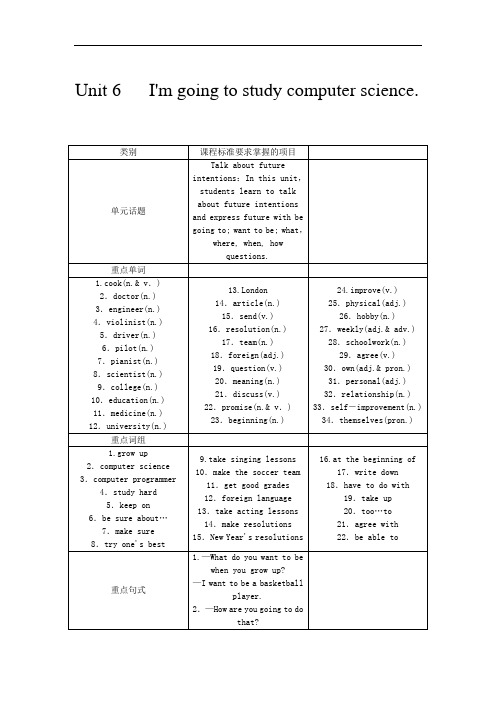
Unit 6I'm going to study computer science.第一课时Section A (1a~1c)§自主学习案用所给单词的适当形式填空。
1.My father is a computer programmer (program)in a big company.2.Why do you want to be a scientist(science)?3.What does he want to be when he grows(grow) up?4.Li Yundi is a famous pianist(piano)in the world.5.Li Ming wants to be a basketball player(play) like Yao Ming.§课堂导学案Step 1准备与热身(Preparation)Hello,everyone!We know every child has his own great idea. I think you do the same. When you grow up, maybe you want to be a teacher, a businessman, a pilot, or an engineer. Today we are going to talk about the topic about your intention. Turn to look at Unit 6:I'm going to study computer science.Look at the blackboard and read after me the target language for this unit.When you read,pay attention to going to,want to be,and what, where, when, how questions.Do you know what intention means? It means something you want to do or plan to do in the future. It is not something which will definitely happen.I will give you one minute to think about ways you already know to talk about future events. And you can use the question words where, when, what, how long to ask and answer questions.For example:Q:Where are you going next week?A:I'm going to summer camp.Q:How long are you staying?A:I'm staying for a week.Q:What are you going to do?A:I'm swimming there.From the above we know that -ing words express the future tense.Now look at the sentences in the speech bubble on page 41. In this unit, we are using-ing words to talk about things that may or may not happen. We are talking about plans.Step 2呈现与输入(Presentation)On page 41 you will find a box with twelve different jobs. Now you are going to rank the twelve jobs from the most interesting to the least interesting.And after that you shall fall into pairs to talk about the reasons.Step 3练习与体验(Practice)Listen and fill in the blanks. Read the phrases in the two columns first. Then listen to four conversations and draw lines connecting the jobs and the activities.Let's check the answers.Keys: 1→b; 2→c; 3→d; 4→aStep 4运用与生成(Production)Now in pairs go on to ask your partner what they are going to be and how they are going to do.Now I'll give you a model conversation and you may practice like this:A:What do you want to be when you grow up?B:I want to be a basketball player.A:How are you going to do that?B:I'm going to practice basketball every day.This period we've learnt the questions of what you are going to do, where you are going, how you are going to do that and when you are going to do.Plan first is a good start.Step 5巩固与提高(Progress)【探究点】What are you going to be when you grow up?你长大以后打算做什么?①“be going to+动词原形”构成一般将来时态,表示计划或安排要发生的动作,有时也可以表示推测将要或肯定会发生的动作,有“准备;打算”之意。
2017年秋季新人教版八年级英语上册重点句型汇总(Unit5)
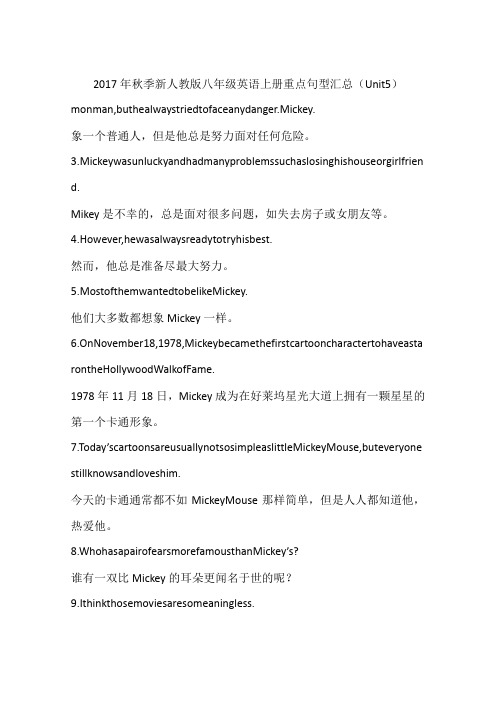
2017年秋季新人教版八年级英语上册重点句型汇总(Unit5)monman,buthealwaystriedtofaceanydanger.Mickey.象一个普通人,但是他总是努力面对任何危险。
3.Mickeywasunluckyandhadmanyproblemssuchaslosinghishouseorgirlfriend.Mikey是不幸的,总是面对很多问题,如失去房子或女朋友等。
4.However,hewasalwaysreadytotryhisbest.然而,他总是准备尽最大努力。
5.MostofthemwantedtobelikeMickey.他们大多数都想象Mickey一样。
6.OnNovember18,1978,Mickeybecamethefirstcartooncharactertohaveasta rontheHollywoodWalkofFame.1978年11月18日,Mickey成为在好莱坞星光大道上拥有一颗星星的第一个卡通形象。
7.Today’scartoonsareusuallynotsosimpleaslittleMickeyMouse,buteveryone stillknowsandloveshim.今天的卡通通常都不如MickeyMouse那样简单,但是人人都知道他,热爱他。
8.WhohasapairofearsmorefamousthanMickey’s?谁有一双比Mickey的耳朵更闻名于世的呢?9.Ithinkthosemoviesaresomeaningless.我认为那些电影如此地毫无意义。
10.I’dliketofindoutwhatdifferentpeoplethinkofasubject.我喜欢发现不同的人对同一主题的看法。
11.Ihopetofindoutwhat’sgoingonaroundtheworld.我希望发现世界正在发生的事情。
人教版八年级英语上册知识点总结和复习要点
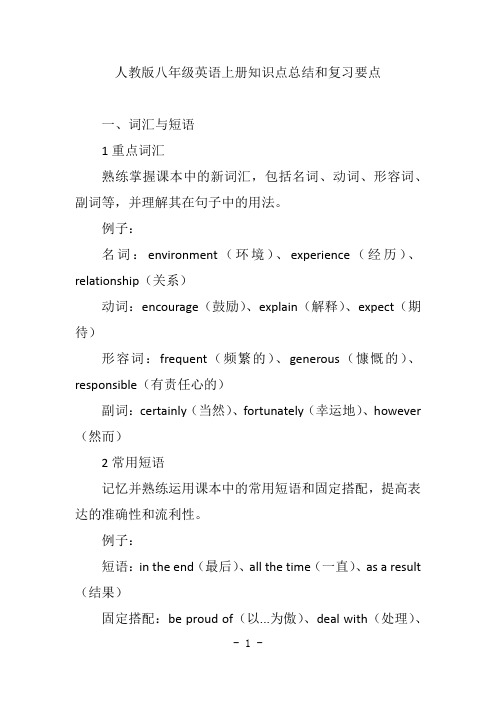
人教版八年级英语上册知识点总结和复习要点一、词汇与短语1重点词汇熟练掌握课本中的新词汇,包括名词、动词、形容词、副词等,并理解其在句子中的用法。
例子:名词:environment(环境)、experience(经历)、relationship(关系)动词:encourage(鼓励)、explain(解释)、expect(期待)形容词:frequent(频繁的)、generous(慷慨的)、responsible(有责任心的)副词:certainly(当然)、fortunately(幸运地)、however (然而)2常用短语记忆并熟练运用课本中的常用短语和固定搭配,提高表达的准确性和流利性。
例子:短语:in the end(最后)、all the time(一直)、as a result (结果)固定搭配:be proud of(以...为傲)、deal with(处理)、pay attention to(注意)二、句型与语法1基本句型熟练掌握五种基本句型,包括主语+谓语、主语+谓语+宾语、主语+谓语+间接宾语+直接宾语、主语+谓语+宾语+宾语补足语、主语+系动词+表语。
例子:主语+谓语:She sings.(她唱歌。
)主语+谓语+宾语:I like apples.(我喜欢苹果。
)主语+谓语+间接宾语+直接宾语:He gave me a book.(他给了我一本书。
)主语+谓语+宾语+宾语补足语:I found the book interesting.(我发现这本书很有趣。
)主语+系动词+表语:She is beautiful.(她很漂亮。
)2时态深入学习并掌握现在完成时、过去进行时、一般将来时、过去将来时等时态的用法和形式。
例子:现在完成时:I have already seen that movie.(我已经看过那部电影了。
)过去进行时:They were playing football when I called them.(我打电话给他们时,他们正在踢足球。
2017年秋人教版八年级英语上册复习资料必考知识点大汇总

Unit1 Where did you go on vacation?【重点语法】不定代词:不指名代替任何特定名词形容词的代词叫做不定代词。
用法注意:1. some和any +可数名/不可数名。
some多用于肯定句,any多用于否定句、疑问句和条件从句。
有些问句中用some,不用any,问话者希望得到对方肯定回答。
2. 由some, any, no, every 与 body, one, thing构成的复不定代词作主语时,其谓语动词用三单。
3. 不定代词若有定语修饰,该定语要置于其后:如:something interesting【重点短语】1. buy sth for ab./ buy sb. sth 为某人买某物2. taste + adj. 尝起来……3. nothing...but + V.(原形)除了……之外什么都没有4. seem + (to be) + adj 看起来5. arrive in + 大地方到达某地arrive at + 小地方到达某地6. decide to do sth. 决定做某事7. try doing sth. 尝试做某事/try to do sth. 尽力做某事8. enjoy doing sth. 喜欢做某事9. want to do sth. 想去做某事10. start doing sth. 开始做某事=begin doing sth.11. stop doing sth. 停止做某事区分:stop to do sth. 停下来去做某事12. dislike doing sth. 不喜欢做某事13. so + adj + that + 从句如此…以至于14. tell sb. (not) to do sth. 告诉某人(不要)做某事15. keep doing sth. 继续做某事16. forget to do sth. 忘记去做某事forget doing sth 忘记做过某事【词语辨析】1. take a photo/ take photos 拍照quite a few+名词复数“许多…”2.seem + 形容词看起来…You seem happy today.seem + to do sth. 似乎/好像做某事I seem to have a cold.It seems + 从句似乎…It seems that no one believe you. seem like ... 好像,似乎…It seems like a good idea.3. arrive in +大地点= get to= reach+地点名4. feel like sth 感觉像…feel doing sth. 想要做某事5. wonder(想知道)+疑问词(who, what, why)引导的从句。
人教版英语八年级上册重点知识归纳
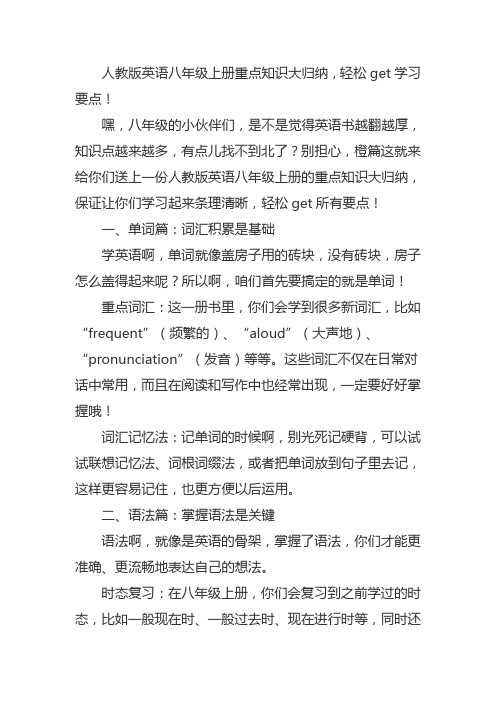
人教版英语八年级上册重点知识大归纳,轻松get学习要点!嘿,八年级的小伙伴们,是不是觉得英语书越翻越厚,知识点越来越多,有点儿找不到北了?别担心,橙篇这就来给你们送上一份人教版英语八年级上册的重点知识大归纳,保证让你们学习起来条理清晰,轻松get所有要点!一、单词篇:词汇积累是基础学英语啊,单词就像盖房子用的砖块,没有砖块,房子怎么盖得起来呢?所以啊,咱们首先要搞定的就是单词!重点词汇:这一册书里,你们会学到很多新词汇,比如“frequent”(频繁的)、“aloud”(大声地)、“pronunciation”(发音)等等。
这些词汇不仅在日常对话中常用,而且在阅读和写作中也经常出现,一定要好好掌握哦!词汇记忆法:记单词的时候啊,别光死记硬背,可以试试联想记忆法、词根词缀法,或者把单词放到句子里去记,这样更容易记住,也更方便以后运用。
二、语法篇:掌握语法是关键语法啊,就像是英语的骨架,掌握了语法,你们才能更准确、更流畅地表达自己的想法。
时态复习:在八年级上册,你们会复习到之前学过的时态,比如一般现在时、一般过去时、现在进行时等,同时还会学到新的时态,比如一般将来时和过去进行时。
记得哦,时态的学习不仅要掌握基本的结构和用法,还要多做练习,才能熟练运用。
从句入门:这一册书里啊,你们还会接触到从句,比如宾语从句、定语从句等。
刚开始学的时候啊,可能会觉得有点儿难,但是别担心,只要跟着老师的节奏,多做练习,你们一定能掌握好的!三、阅读篇:提升阅读理解能力阅读理解啊,是英语考试中的重头戏,也是检验你们英语综合能力的一个重要方面。
阅读技巧:做阅读理解题的时候啊,一定要先快速浏览文章,抓住文章的主旨大意;然后再仔细阅读题目和选项,根据题目要求去文章中找答案。
记得哦,不要一遇到生词就紧张,可以根据上下文去猜测它的意思。
课外阅读:除了课本上的阅读文章外啊,你们还可以多读一些英语短文、故事书或者英文报纸杂志等,这样不仅可以提升你们的阅读理解能力啊,还可以拓宽你们的视野和知识面哦!四、写作篇:锻炼写作能力写作啊,是检验你们英语综合运用能力的一个重要环节。
新人教版八年级上册英语全册期末复习必背知识点归纳
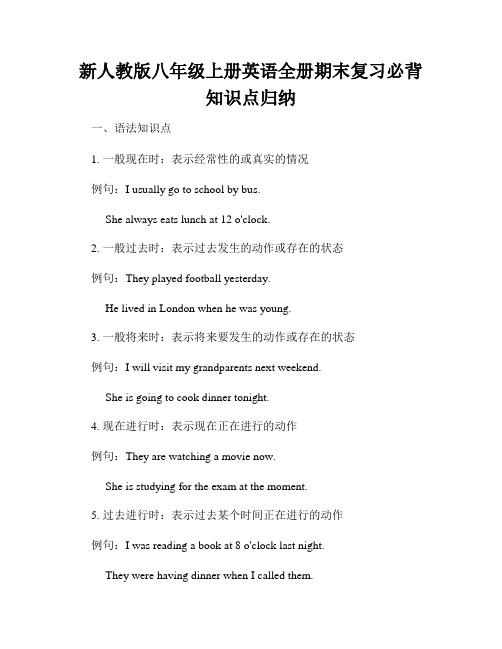
新人教版八年级上册英语全册期末复习必背知识点归纳一、语法知识点1. 一般现在时:表示经常性的或真实的情况例句:I usually go to school by bus.She always eats lunch at 12 o'clock.2. 一般过去时:表示过去发生的动作或存在的状态例句:They played football yesterday.He lived in London when he was young.3. 一般将来时:表示将来要发生的动作或存在的状态例句:I will visit my grandparents next weekend.She is going to cook dinner tonight.4. 现在进行时:表示现在正在进行的动作例句:They are watching a movie now.She is studying for the exam at the moment.5. 过去进行时:表示过去某个时间正在进行的动作例句:I was reading a book at 8 o'clock last night.They were having dinner when I called them.6. 情态动词 can 和 could:表示能力或许可例句:I can swim very well.He could speak three languages when he was young. 7. 情态动词 must 和 have to:表示义务、必须或强制性例句:You must finish your homework before going out.I have to wake up early tomorrow.8. 情态动词 should:表示建议或应该例句:You should eat more vegetables for better health. She should go to bed early for enough sleep.9. 动词不定式:表示目的、原因、结果或时态等例句:I went to the supermarket to buy some fruits.She is happy to hear the good news.二、词汇知识点1. 人称代词:用于代替特定人或物例句:He is my brother.They are good friends.2. 数词:表示数量的词语例句:There are ten students in the classroom.I have two cats and three dogs.3. 形容词:修饰名词或代词,描述人或物的特征例句:She is a beautiful girl.This is a big house.4. 副词:修饰动词、形容词、副词等,表示时间、地点、程度等例句:She runs fast.He speaks English fluently.5. 介词:介绍名词与其他词语之间的关系例句:I have a pen in my bag.The book is on the table.6. 连词:连接句子、词组或单词例句:I like swimming and playing basketball.She can play the guitar or the piano.7. 冠词:用于限定名词例句:I have an apple.The book on the table is mine.三、题型解析1. 完形填空题:根据上下文意思,选出合适的单词填空Tom: What's your favorite ________?Emily: I like watching ________.Tom: Me too. Let's go to the ________ tonight.A. colorB. movieC. sportD. book答案:B2. 阅读理解题:阅读短文,回答相关问题例题:My name is Lucy. I am twelve years old. I ________ to school every day. My favorite ________ is English. I like playing basketball ________ school. My dream is to become a ________ in the future.What does Lucy like playing?A. basketballB. soccerC. tennisD. volleyball答案:A3. 选择填空题:选择合适的单词或短语填空例题:Lucy: What's your ________ food, Tom?Tom: I like ________ because it tastes delicious.A. favoriteB. leastC. difficultD. easy4. 任务型阅读题:根据文章内容,完成相应的任务例题:请你根据短文内容,回答以下问题:What is the main idea of the passage?答案:The passage is about Lucy's daily life and her dream.四、写作技巧1. 写作时要注意使用适当的句式和词汇,使文章更加丰富多样。
2017人教版八年级英语上册各单元知识点归纳总结

2017人教版八年级英语上册知识点归纳与总结1-10单元总览Unit 1 Where did you go on vacation? (谈论假期生活,一般过去时)Unit 2 How often do you exercise? (谈论生活习惯,一般现在时)Unit 3 I'm more outgoing than my sister(谈论事物对比,形容词比较级)Unit 4 What’s the best movie theater? (谈论事物比较,形容词最高级)Unit5 Do you want to watch a game show? (谈论内心想法,一般现在时)Unit6 I’m going to study computer science. (谈谈生活的目标,一般将来时)Unit7 Will people have robots? (对将来生活的预言,一般将来时)Unit8 How do you make a banana milk shake? (描述进程,祈使句)Unit9 Can you come to my party? (学习邀请,作出.接受和拒绝邀请,学习表请求的句子) Unit10 If you go to the party, you’ll have a great time. (作出决定,学习if的条件状语从句)1-10单元复习要点归纳Unit 1 Where did you go on vacation?第一单元复习要点:★1、复习一般过去时★2、复合不定代词的用法3、反身代词的用法4、系动词和感官动词的用法5、动词后的to do和doing 的区别6、ed形容词和ing形容词的区别★7、动词过去式的构成及不规则动词表(教材p142-143必背)一、重点单词复合不定代词:(anyone, anywhere, something, nothing, everyone, someone); wonder, wonderful; 反身代词:(myself; yourself); few; most; bored; decide; try; difference; enough; below, umbrella二、重点短语1.go on vacation去度假2.too many 太多(后跟可数名词复数)3.quite a few 相当多4.study for a test为考试学习5.taste good 尝起来味道好6.have a good time玩的开心7.of course当然可以8.feel like感觉像……/想要9.something important重要的事情10.because of 因为11. most of the time 大多数时间12. arrive in 到达13. Long time no see好久不见14. keep a diary写日记15. go to the mountains 去爬山16. go to the beach到海边去17.visit the museums 参观博物馆18. go to summer camp 去夏令营19.go out 出去20.go shopping购物21.in the past 在过去22.walk around四处走走23.one bowl of rice 一碗米饭24.find out 查出来/发现25.go on继续26.stay at home 呆在家27.take photos 照相28.up and down上上下下e up出来三、习惯用法、搭配1. buy sth. for sb./ buy sb. sth. 为某人买某物(sb.某人;sth.某物)★2. taste + adj. 尝起来,,(adj.形容词)3. arrive in + 大地方/ arrive at + 小地方到达某地★4. decide to do sth. 决定做某事(to do表示动词不定式,就是在动词原形前加to)★5. try doing sth. 尝试做某事/ try to do sth. 尽力做某事6. enjoy doing sth. 喜欢做某事7. want to do sth. 想去做某事8. start doing sth. 开始做某事9. stop doing sth. 停止做某事10. look + adj看起来11. dislike doing sth. 不喜欢做某事12. Why not do sth. 为什么不做,,.呢?13. so + adj + that + 从句如此,,以至于,,★14. tell sb. (not) to do sth. 告诉某人(不要)做某事15. keep doing sth. 继续做某事★16. forget to do sth. 忘记去做某事/ forget doing sth 忘记做过某事四、重点句子--Where did you go on vacation? 你到哪里去度假了?---I went to New York City.我去了纽约城--Did you go out with anyone? 你出去带人吗?--No, No one was here. Everyone was on vacation.不没有人在这儿。
2017年人教版八年级英语上册知识点总结全(供参考)
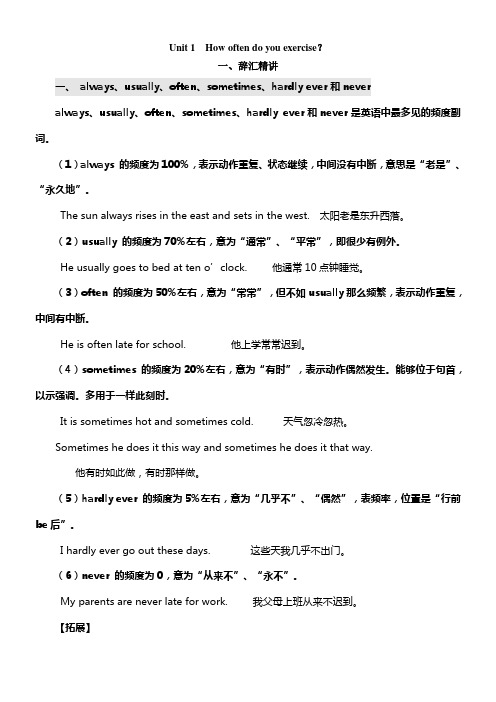
(2)usually 的频度为70%左右,意为“通常”、“平常”,即很少有例外。
He usually goes to bed at ten o’clock. 他通常10点钟睡觉。
【拓展】
go swimming去游泳go skating去滑冰go fishing去钓鱼
go boating去划船do some reading阅读do some washing洗涮do some cooking做饭
do some swimming游泳do some speaking多说do some listening多听
7、once a week/ twice a week
once“一“基数词+times”表示,time在那个地址为可数名词,意为“次数”,复数加s。
I wash my face twice a day.我天天洗两次脸。
He has been there four times.他去过那里四次。
I hardly ever go out these days. 这些天我几乎不出门。
(6)never 的频度为0,意为“从来不”、“永不”。
My parents are never late for work. 我父母上班从来不迟到。
【拓展】
(1)这些副词在句子中的位置大体相同,一样放在助动词、be动词或情态动词以后,行为动词之前。即:“行”前“助(系)”后。
want的用法还有:want sth.想要什么
want to do sth.想要做某事
She wants a cup of tea.她想要一杯茶。
【人教版】2017版八年级英语上册期末复习知识点总结1 (33)
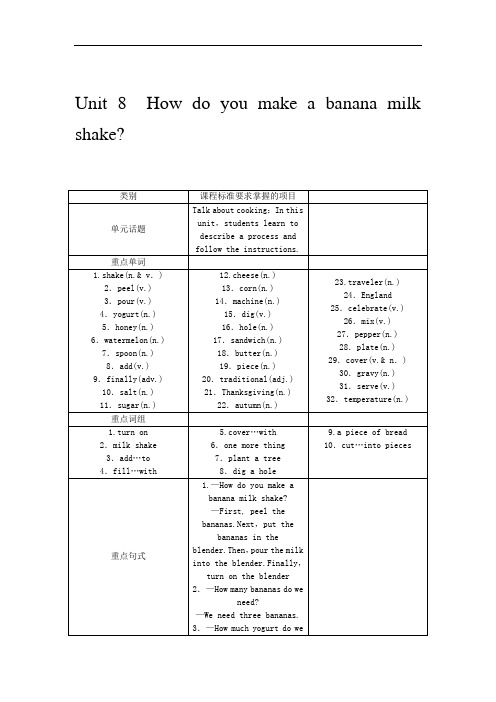
Unit 8How do you make a banana milk shake?第一课时Section A (1a~1c)§自主学习案根据句意及汉语提示完成单词。
1.Do you like to drink yogurt(酸奶)?2.Eating too much salt(盐)is bad for our health.3.Water with honey(蜂蜜)is good for our throat.4.Why are they digging holes(洞)over there?5.You should peel(剥皮)bananas before you eat them.§课堂导学案Step 1准备与热身(Preparation)T:Hello,everyone!Today we are going to talk about drinks. What is your favorite drink?Ss:Coke cola,green tea,water and orange juice.T:Today we are going to learn a new kind of drink,banana milk shake. What is it? A beverage made of milk,flavoring, and ice-cream,shaken or whipped until foamy.Blender means a kind of machine that blends, with whirling blades for chopping, mixing, or liquefying foods. Here are two pictures about them.Let's see how to make a banana milk shake.Warming up by learning grammarGrammar FocusCountable items are things we can count, one, two,three …for example:one pen,two computers. Uncountable items are things we can't count. They are not separate items.When we talk about them we should use a noun that can express amount, for example,a cup of milk,one teaspoon of cinnamon.Step 2呈现与输入(Presentation)Look at the picture in 1a on page 57. There are some actions.What are they doing? Let's see how to fill them into the picture.When you do this exercise you should pay attention to the order of these actions.Step 3练习与体验(Practice)If we want to make something,we should follow the instructions.Instruction means a guide to make something that you can follow. Let's listen to the tape and put the instructions in the right order and we will know how to make a banana milk shake.Step 4运用与生成(Production)First,we should read the instructions several times.Then please don't look at your books and tell your partners how to make a banana milk shake. You can use these words “first, next, then and finally”. Sometimes English speakers pause after these words and this helps the listener notice that the speaker is saying a set of steps. You can pay attention to it when you talk with your partner.Step 5巩固与提高(Progress)【探究点】Turn on the blender.打开搅拌器。
八年级上册英语unit34知识点汇总2017人教版
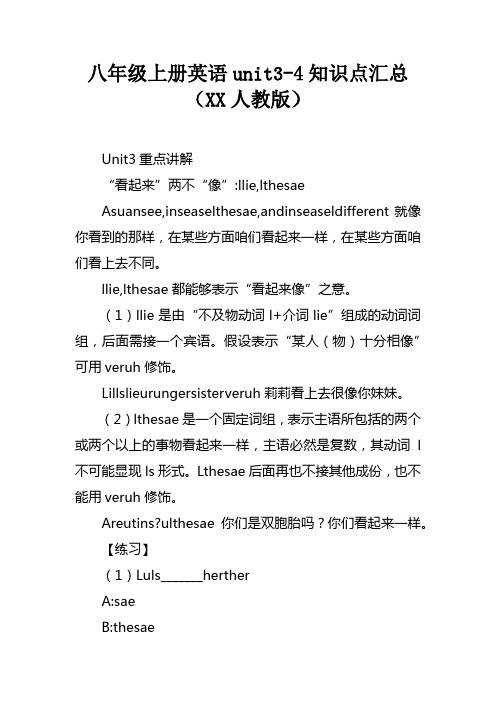
八年级上册英语unit3-4知识点汇总(XX人教版)Unit3重点讲解“看起来”两不“像”:llie,lthesaeAsuansee,inseaselthesae,andinseaseldifferent就像你看到的那样,在某些方面咱们看起来一样,在某些方面咱们看上去不同。
llie,lthesae都能够表示“看起来像”之意。
(1)llie是由“不及物动词l+介词lie”组成的动词词组,后面需接一个宾语。
假设表示“某人(物)十分相像”可用veruh修饰。
Lillslieurungersisterveruh莉莉看上去很像你妹妹。
(2)lthesae是一个固定词组,表示主语所包括的两个或两个以上的事物看起来一样,主语必然是复数,其动词l 不可能显现ls形式。
Lthesae后面再也不接其他成份,也不能用veruh修饰。
Areutins?ulthesae你们是双胞胎吗?你们看起来一样。
【练习】(1)Luls_______hertherA:saeB:thesae:asD:lie(2)Althughthearesisters,thedn't_______________________(看起来一样)2all,bth“都”不同ebthhaveblaees咱们都有黑色的眼睛(P33)bth与all的用法相似。
bth强调二者都,而all那么强调三者或三者以上都。
bth可用作形容词、代词和副词,其用法如下:词条区别例句代词“二者,两边,两人”,与f连用Bthftheareteahers他们两都是教师。
Bthfthestudentsarehere=Bththestudentsarehere=Thestudentsarebthhere两个学生都在这儿。
副词“二者,二者都”,位于行为动词之前,be动词、助动词、情态动词以后。
ThebthentshppinglastSunda上周日他们俩都去购物了。
Thetinsarebthstudents这对双胞胎都是学生。
2017八年级上册英语复习必备知识点归纳Unit4—Unit6人教版

2017八年级上册英语复习必备知识点归纳(Unit4—Unit6人教版)2017八年级上册英语复习必备知识点归纳(Unit4—Unit6人教版)八年级上 Unit4---Unit6一.重点短语:1.taubway2.all over/around the world .be dl bus 5.study for agda dave a piano lday awquiet /be quiet e ovbav2ways 1do the same things as sb.16.udbegin w’bus /train /subway station20.a21.meaansportation 22.all kinds of23.depend on 24.g25.keep quiet 26.primal二.考点归纳:考点1.有关交通工具的同义句:1).taain to … =go to …by traintake the bus to …= go to …by bus2).fly to … = go to … by plane /airwalk to …. = go to …de a bike to … = go to …. by buncle went to New York last wuncle _____ _____ New York last week .考点2.有关花费时间的句型:1).It +takes +sb.+时间+to do sth2).sb. +spend +时间+on sth (in doing sth ).Ialf an hour to wut .I_____ half an hour ______ it out .考点3.表示两地相距有多远:A +be +距离+from +B = It’s +距离+from A+ to B. It is five minutes’ wall. = It ______ me five minutes to _____l .考点4.leave ,leavleave … for …1).leave +地点“离开某地”2).leave for +地点“前往某地”=go to +某地3).leave +某地+for +某地“离开某地前往某地”Mr wang are going to Beijingw .=Mr wang are _____ ______ Beijingw.考点5.all …all “并非都” 部分否定注:not 与all /both /every ….. 连用构成部分否定。
2017年人教版初中英语八年级英语上册全套课文知识点同步精讲Unit8
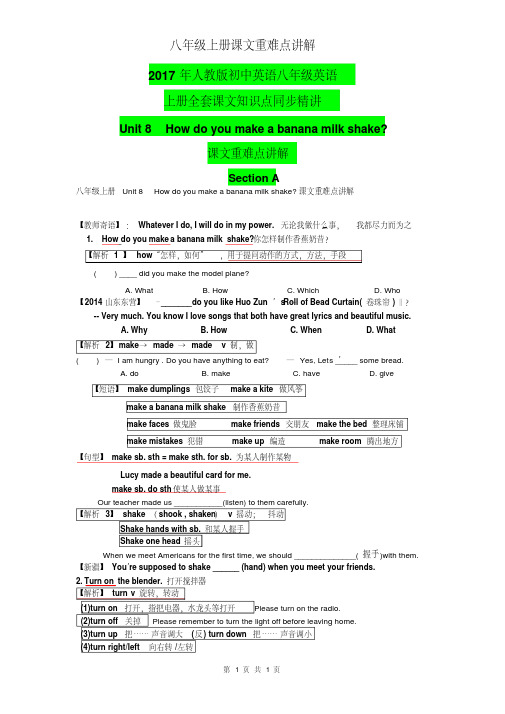
2017年人教版初中英语八年级英语上册全套课文知识点同步精讲Unit 8 How do you make a banana milk shake?课文重难点讲解Section A八年级上册Unit 8 How do you make a banana milk shake?课文重难点讲解【教师寄语】:Whatever I do, I will do in my power.无论我做什么事,我都尽力而为之1.How do you make a banana milk shake?你怎样制作香蕉奶昔?【解析 1 】how“怎样,如何”,用于提问动作的方式,方法,手段( ) ____ did you make the model plane?A. WhatB. HowC. WhichD. WhoRoll of Bead Curtain(卷珠帘)‖?【2014山东东营】– _______do you like Huo Zun’s ―-- Very much. You know I love songs that both have great lyrics and beautiful music.A. WhyB. HowC. WhenD. What【解析2】make→made →made v制,做s _____ some bread. ( ) —I am hungry . Do you have anything to eat? —Yes, Let’A. doB. makeC. haveD. give【短语】make dumplings 包饺子make a kite 做风筝make a banana milk shake 制作香蕉奶昔make faces 做鬼脸make friends 交朋友make the bed 整理床铺make mistakes 犯错make up 编造make room 腾出地方【句型】make sb. sth = make sth. for sb. 为某人制作某物Lucy made a beautiful card for me.make sb. do sth使某人做某事Our teacher made us ___________(listen) to them carefully.【解析3】shake (shook , shaken)v 摇动;抖动Shake hands with sb. 和某人握手Shake one head 摇头When we meet Americans for the first time, we should ______________(握手)with them.【新疆】You’re supposed to shake ______ (hand) when you meet your friends.2. Turn on the blender. 打开搅拌器【解析】turn v旋转,转动(1)turn on 打开,指把电器,水龙头等打开Please turn on the radio.(2)turn off 关掉Please remember to turn the light off before leaving home.(3)turn up 把……声音调大(反) turn down 把……声音调小(4)turn right/left 向右转/左转(5)turn to 翻到Turn to Page5.(6)take turn to do sth 轮流做某事one’sturn to do sth 轮到某人做某事(7)It’s【2012宁夏中考】The room was dark , so she asked me to ____ the lights.A. turn upB. turn downC. turn offD. turn on 【2013福建福州】Remember to________ ________(关掉)the tap when you are not using it.【2014成都2】Mum wants to watch the CCTV news. Let’s ___________the TV.A. turn downB. turn onC. turn off【2014四川乐山】—Would you be so kind as to ____ your music?I am preparing for tomorrow’s speech.—Sure. Sorry to disturb you.A. turn downB. turn upC. turn on4. cut up the bananas. 切碎香蕉【解析】cut→cut→cut v切,割cut up 切碎【注】:(v +adv),跟代词做宾语,代词放中间,名词做宾语,可放在中间或后边cut …into…把…切割成…Can you cut the meat into slices?cut down 砍倒We mustn’t cut down any trees.cut off 切断,砍掉cut in 插嘴cut one’s hair 理发【2013雅安】If farmers ______ trees and forests, giant pandas _____ nowhere to live.A. cut down; haveB. will cut down; will haveC. will cut don; haveD. cut down; will have5. Peel three bananas. 剥三根香蕉【解析】peel (1)v剥皮,削皮peel sb. sth=peel sth for sb. 为某人削(水果皮)Mary peeled me an apple(2) n水果皮apple peel 苹果皮orange peel 香蕉皮6. Pour the milk into the blender. 将牛奶倒入搅拌器【解析1】pour v倒,灌into prep 到…里,进入到……之内⑴pour … into…把….倒进…Please pour the milk into the blender.⑵Pour … out…把……到出Please pour the cold water out .( ) Don’t _____ waste water into the river.A. turnB. makeC. pourD. put【解析2】in/ intoin 是表示物体位置的静态介词in the desk.into 是表示动作方向的动态介词。
2017-2018学年新人教版初中英语八年级英语上各单元重点词组总结归纳【期中期末推荐】

2017-2018学年新人教版初中英语八年级英语上各单元重点词组总结归纳【期中期末推荐】Unit1 Where did you go on vacation?1. go on vacation 去度假2. stay at home 待在家里3. go to the mountains 去爬山4. go to the beach 去海滩5. visit museums 参观博物馆6. go to summer camp 去参观夏令营7. quite a few 相当多8. study for 为……而学习9. go out 出去10. most of the time 大部分时间11. taste good 尝起来很好吃12. have a good time 玩得高兴13. of course 当然14. feel like 给……的感觉;15. go shopping 去购物16. in the past 在过去17. walk around 四处走走18. because of 因为19. one bowl of… 一碗…… 20.the next day 第二天21.drink tea 喝茶.22. find out 找出;查明.23. go on 继续24. take photos 照相25. something important 重要的事26. up and down 上上下下27. come up 出来28. buy sth. for sb. / buy sb. sth. 为某人买某物29. taste + adj. 尝起来……30. look+adj. 看起来……31. nothing…but+动词原形除了之外什么都没有32. seem+(to be)+ adj. 看起来……33. arrive in+ / at 到达某地34. decide to do sth. 决定去做某事35. try doing sth. 尝试做某事try to do sth. 尽力去做某事36. forget doing sth. 忘记做过某事/forget to do sth. 忘记做某事37. enjoy doing sth. 喜欢做某事38. want to do sth. 想去做某事39. start doing sth. 开始做某事40. stop doing sth. 停止做某事41. dislike doing sth. 不喜欢做某事42. keep doing sth. 继续做某事43. Why not do. sth.?为什么不做……呢?.44. so+adj.+that+从句如此……以至于……45. tell sb. (not) to do sth.告诉某人(不要)做某事Unit2 How often do you exercise?1. help with housework 帮助做家务2. on weekends 在周末3. how often 多久一次4. hardly ever 几乎从不5. once a week 每周一次6. twice a month 每月两次7. every day 每天8. be free 有空9. go to the movies 去看电影10. use the Internet 用互联网11. swing dance 摇摆舞12. play tennis 打网球13. stay up late 熬夜;睡得很晚.14. at least 至少15. have dance and piano lessons上舞蹈课和钢琴课16. go to bed early 早点睡觉17. play sports 进行体育活动18. be good for 对……有好处19. go camping 去野营20. not…at all 一点儿也不……21. in one’s free time 在某人的业余时间.22. the most popular 最受欢迎的23. such as 比如;诸如24. old habits die hard 积习难改25. go to the dentist 去看牙医26. morn than 多于;超过27. less than 少于28. help sb. with sth. 帮助某人做某事29. How about…? ......怎么样?/ ……好不好?30. want sb. to do sth. 想让某人做某事31. How many /much 多少……?32. 主语+find+that从句. ……发现……33. spend time with sb. 和某人一起度过时光34. It’s+ adj.+ to do sth. 做某事是……的。
2016-2017学年新目标人教版初中英语八年级上期中期末复习提要复习归纳整理(Units1-10)

12.stand --- sit stand up --- sit down13. lose --- find 14. accept --- refuse15. turn on --- turn off turn up --- turn down16. different --- same be different from --- be the same as17. day ---- night in the daytime---- at night18. beginning --- end at the beginning of --- at the end of19. many --- few much --- little more --- less least --- most20. first --- last at first --- at last21. everything --- nothing everybody --- nobody22. both --- neither all --- none23. free --- busy/full full --- hungry 24.pretty ---ugly25. interesting --- boring interested ---- bored26. careful --- careless carefully --- carelessly27. meaningful --- meaningless 28. sad --- glad29. dangerous --- safe 30. simple --- difficulthard31. good --- bad better --- worse best --- worst32. lazy ---- hard-working 33. poor --- rich34. wet --- dry 35. never --- always36. quiet --- loud quietly --- loudly37. below --- above 38. with --- withoutIII. phrases1.of course2. on vacation summer camp3.make friends make mistakes make money make soup/zongzi/ a wish交朋友犯错误挣钱做汤/包粽子/许愿make the soccer team make promises to sb. 向某人承诺make a fire keep a promise break a promise4.help (sb.) with sth. agree with sb.5.be good with be good at be good for be good to6.seem to be tired seem impossible7.quite a few8.nothing special somewhere wonderful9.on weenends on weekdays on school days/nights10. after school after class after lunch before dinner11. dress up get up get dressed get lost get popular get asurprise get to get an education get enough exercise 12. take a shower take a walk take photos by subway/train/bus /taxitake the subway/train/bus /taxi take acting lessons13. ride a bicycle 14. feel like15. half an hour a quarter to ten a quarter past six half past seven16. wait for can’t wait to do sth. 迫不及待做某事17. because of 18. hardly ever19.enough money hungry enough carefully enough20. tastes good sounds good 21. such as for example22. at least 23. more than24. Long time no see. 25. swing dance 26. junk food27 once a week twice a month three or four times a yearfour to six times a week three meals a day一日三餐28. come true 29. one 11-year-old boy five - hour bus ride30. go online go shopping/swimming/.fishing/bike riding /boating31. go to the doctor go to the dentist 去看牙医go to the movies32. how far how long how many how much how old33. Thanks for your invitation/asking.34. the same as be different from 35. fifteen percent of the students36. truly talented pretty bad37. bring out使显现;使表现出find out hang outhelp out go out eat out blow out38.have ...in common 39. be up to welcome to…40. touch one’s heart reach for one’s hand 伸手帮助某人be there for sb.41. play a role 发挥作用;有影响play a part参与;发挥作用42. be strict with sb. be angry with43. be famous for be famous as44. make up grow up wake up put up45. take … seriously认真对待….. take a message take a trip46. in the past in the future in the sky in the end47. all kinds of a kind of kind of48. be sure about make sure49. be ready to be able to be interested in50. soap opera action movie talk show game showtalent show sports show a cartoon character51. in the 1930s in the coming year52. read a newspaper/bookwatch TV/ a video / the running races/a soccer game/news53. take sb’s place 54. do a good job55. the old people’s home children’s hospital the Dragon Boat FestivalThai Elephant Day Children’s Day Women’s Day Teachers’Day56. talk on the phone watch the boat races on computers57. try one’s best try to do sth.尽力做某事58. get back from school call (sb. )back59. become rich /famous become an engineer60. at the beginning of as long as61. havea great time 62. study hard study medicine at a university63. have to do with have problems with64. write down write to sb.65. keep … to oneself keep on doing sth66. another time another foreign languageanother ten minutes another thing/one more thing67. fall down68. look for look after look at look like look forward to69. live to be 200 years old live in an apartment70. move to other planets on the right/left71. a piece of paper/news/music/bread 一张纸/一则新闻/一首音乐/一块面包72. enjoy reading see/hear sb. doing sth.73. in fact in half in life in space in dangerout of danger74. on a space station on paper75. computer programmer a race car driver 一个赛车手The book here is newer than the one on the desk.The apples on the tree are fresher than the ones/those in the box.The weather in Wuhan is hotter than that in Xi’an.③最高级用于三者之比,标志:of/in +范围,one of +the +最高级+复数,the +序数词+最高级+ 单数vi. Prepositions介词一般用于名词或代词前,表示该词与句子其他成分的关系。
2017年新人教版八年级英语上册重点总复习资料
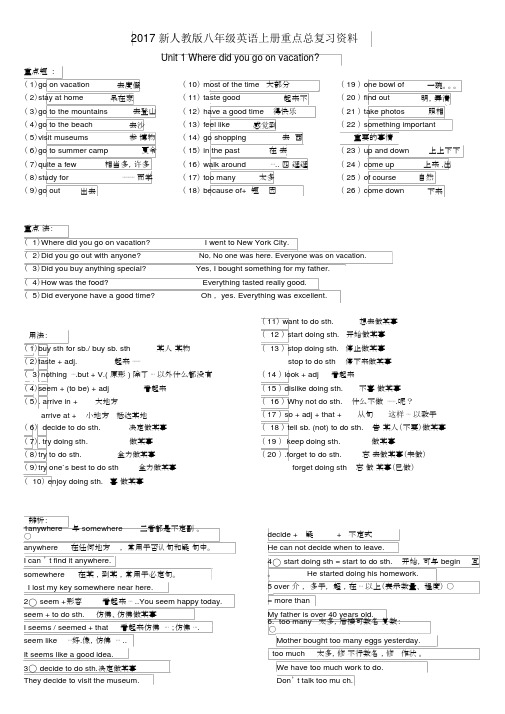
2017 新人教版八年级英语上册重点总复习资料Unit 1 Where did you go on vacation?重点短 :( 1)go on vacation去度假( 10) most of the time 大部分( 19 ) one bowl of一碗。
( 2)stay at home呆在家( 11) taste good起来不( 20 ) find out明,弄清( 3)go to the mountains去登山( 12) have a good time 得快乐( 21 ) take photos照相( 4)go to the beach去沙( 13) feel like感觉到( 22 ) something important( 5)visit museums参博物( 14) go shopping去西重要的事情( 6)go to summer camp夏令( 15) in the past在去( 23 ) up and down上上下下( 7)quite a few相当多,许多( 16) walk around⋯.. 四逛逛( 24 ) come up上来 ,出( 8)study for⋯⋯⋯而学( 17) too many太多( 25 ) of course自然( 9)go out出去( 18) because of+ 短因( 26 ) come down下来重点法:(1)Where did you go on vacation?(2)Did you go out with anyone?(3)Did you buy anything special?(4)How was the food?(5)Did everyone have a good time?I went to New York City.No, No one was here. Everyone was on vacation. Yes, I bought something for my father. Everything tasted really good.Oh , yes. Everything was excellent.用法:( 1)buy sth for sb./ buy sb. sth某人某物( 2)taste + adj.起来⋯⋯(3)nothing ⋯.but + V.( 原形 ) 除了⋯以外什么都没有( 4)seem + (to be) + adj看起来( 5). arrive in +大地方arrive at +小地方抵达某地( 6) decide to do sth.决定做某事( 7). try doing sth.做某事( 8)try to do sth.全力做某事( 9)try one`s best to do sth全力做某事(10) enjoy doing sth. 喜做某事辨析:1anywhere 与 somewhere二者都是不定副。
2017秋人教版英语八年级上册期末复习提纲word下载
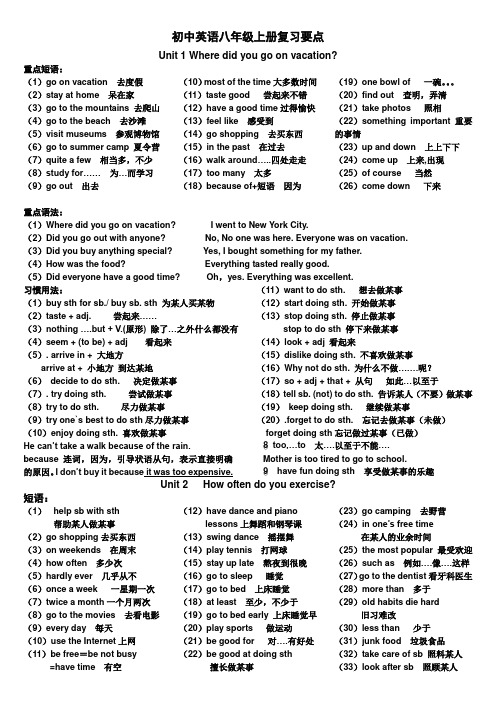
初中英语八年级上册复习要点Unit 1 Where did you go on vacation? 重点短语:(1)go on vacation 去度假(2)stay at home 呆在家(3)go to the mountains 去爬山(4)go to the beach去沙滩(5)visit museums 参观博物馆(6)go to summer camp 夏令营(7)quite a few 相当多,不少(8)study for……为…而学习(9)go out 出去(10)most of the time大多数时间(11)taste good 尝起来不错(12)have a good time过得愉快(13)feel like 感受到(14)go shopping 去买东西(15)in the past 在过去(16)walk around…..四处走走(17)too many 太多(18)because of+短语因为(19)one bowl of 一碗。
(20)find out 查明,弄清(21)take photos 照相(22)something important 重要的事情(23)up and down 上上下下(24)come up 上来,出现(25)of course 当然(26)come down 下来重点语法:(1)Where did you go on vacation? I went to New York City.(2)Did you go out with anyone? No, No one was here. Everyone was on vacation. (3)Did you buy anything special? Yes, I bought something for my father.(4)How was the food? Everything tasted really good.(5)Did everyone have a good time? Oh,yes. Everything was excellent.习惯用法:(1)buy sth for sb./ buy sb. sth 为某人买某物(2)taste + adj. 尝起来……(3)nothing ….but + V.(原形) 除了…之外什么都没有(4)seem + (to be) + adj 看起来(5). arrive in + 大地方arrive at + 小地方到达某地(6)decide to do sth. 决定做某事(7). try doing sth. 尝试做某事(8)try to do sth. 尽力做某事(9)try one`s best to do sth尽力做某事(10)enjoy doing sth. 喜欢做某事(11)want to do sth.想去做某事(12)start doing sth. 开始做某事(13)stop doing sth. 停止做某事stop to do sth 停下来做某事(14)look + adj 看起来(15)dislike doing sth. 不喜欢做某事(16)Why not do sth. 为什么不做…….呢?(17)so + adj + that + 从句如此…以至于(18)tell sb. (not) to do sth. 告诉某人(不要)做某事(19)keep doing sth. 继续做某事(20).forget to do sth. 忘记去做某事(未做)forget doing sth忘记做过某事(已做)He can’t take a walk because of the rain.because 连词,因为,引导状语从句,表示直接明确的原因。
- 1、下载文档前请自行甄别文档内容的完整性,平台不提供额外的编辑、内容补充、找答案等附加服务。
- 2、"仅部分预览"的文档,不可在线预览部分如存在完整性等问题,可反馈申请退款(可完整预览的文档不适用该条件!)。
- 3、如文档侵犯您的权益,请联系客服反馈,我们会尽快为您处理(人工客服工作时间:9:00-18:30)。
2017新人教版八年级英语上册重点总复习资料Unit 1 Where did you go on vacation?重点短语:(1)go on vacation 去度假(2)stay at home 呆在家(3)go to the mountains 去爬山(4)go to the beach去沙滩(5)visit museums 参观博物馆(6)go to summer camp 夏令营(7)quite a few 相当多,不少(8)study for……为…而学习(9)go out 出去(10)most of the time大多数时间(11)taste good 尝起来不错(12)have a good time过得愉快(13)feel like 感受到(14)go shopping 去买东西(15)in the past 在过去(16)walk around…..四处走走(17)too many 太多(18)because of+短语因为(19)one bowl of 一碗。
(20)find out 查明,弄清(21)take photos 照相(22)something important重要的事情(23)up and down 上上下下(24)come up 上来,出现(25)of course 当然(26)come down 下来重点语法:(1)Where did you go on vacation? I went to New York City.(2)Did you go out with anyone? No, No one was here. Everyone was on vacation. (3)Did you buy anything special? Yes, I bought something for my father.(4)How was the food? Everything tasted really good.(5)Did everyone have a good time? Oh,yes. Everything was excellent.习惯用法:(1)buy sth for sb./ buy sb. sth 为某人买某物(2)taste + adj. 尝起来……(3)nothing ….but + V.(原形) 除了…之外什么都没有(4)seem + (to be) + adj 看起来(5). arrive in + 大地方arrive at + 小地方到达某地(6)decide to do sth. 决定做某事(7). try doing sth. 尝试做某事(8)try to do sth. 尽力做某事(9)try one`s best to do sth尽力做某事(10)enjoy doing sth. 喜欢做某事(11)want to do sth.想去做某事(12)start doing sth. 开始做某事(13)stop doing sth. 停止做某事stop to do sth 停下来做某事(14)look + adj 看起来(15)dislike doing sth. 不喜欢做某事(16)Why not do sth. 为什么不做…….呢?(17)so + adj + that + 从句如此…以至于(18)tell sb. (not) to do sth. 告诉某人(不要)做某事(19)keep doing sth. 继续做某事(20).forget to do sth. 忘记去做某事(未做)forget doing sth忘记做过某事(已做)词语辨析:○1anywhere 与somewhere 两者都是不定副词。
anywhere 在任何地方,常用于否定句和疑问句中。
I can’t find it anywhere.somewhere 在某处,到某处,常用于肯定句。
I lost my key somewhere near here.○2seem + 形容词看起来…..You seem happy today. seem + to do sth. 似乎、好像做某事I seems / seemed + that看起来好像…;似乎….seem like ….好像,似乎…..It seems like a good idea.○3decide to do sth.决定做某事They decide to visit the museum. decide + 疑问词+ 动词不定式He can not decide when to leave.○4start doing sth = start to do sth. 开始,可与begin 互换。
He started doing his homework.○5over 介词,多于,超过,在…以上(表示数目、程度)= more thanMy father is over 40 years old.○6. too many 太多,后接可数名词复数:Mother bought too many eggs yesterday.too much 太多,修饰不可数名词,修饰动词作状语。
We have too much work to do.Don’t talk too much.○7because of 因为,由于,后接名词、代词或动名词,不能接句子。
He can’t take a walk because of the rain.because 连词,因为,引导状语从句,表示直接明确的原因。
I don’t buy it because it was too expensive.○8too,…to太….以至于不能….Mother is too tired to go to school.○9have fun doing sth享受做某事的乐趣Unit 2How often do you exercise? 短语:(1)help sb with sth帮助某人做某事(2)go shopping去买东西(3)on weekends 在周末(4)how often 多少次(5)hardly ever几乎从不(6)once a week 一星期一次(7)twice a month一个月两次(8)go to the movies 去看电影(9)every day 每天(10)use the Internet上网(11)be free=be not busy=have time 有空(12)have dance and pianolessons上舞蹈和钢琴课(13)swing dance 摇摆舞(14)play tennis 打网球(15)stay up late熬夜到很晚(16)go to sleep 睡觉(17)go to bed上床睡觉(18)at least 至少,不少于(19)go to bed early 上床睡觉早(20)play sports 做运动(21)be good for 对….有好处(22)be good at doing sth擅长做某事(23)go camping去野营(24)in one’s free time在某人的业余时间(25)the most popular 最受欢迎(26)such as 例如….像….这样(27)go to the dentist看牙科医生(28)more than 多于(29)old habits die hard旧习难改(30)less than 少于(31)junk food垃圾食品(32)take care of sb 照料某人(33)look after sb照顾某人(34)have to do sth必须做某事(35)get in…进入…(36)be late for迟到语法要点:(1)What do you usually do on weekends? I always exercise.(2)What do they do on weekends? They often help my mother with housework. (3)What does she do on weekends? She sometimes goes shopping.(4)How often do you go to the movies? I go to the movies maybe once a month. (5)How often does he watch TV? He hardly ever watches TV.(6)Do you go shopping? No, I never go shopping.习惯用法:1. help sb. with sth=help sb do sth帮助某人做某事2. How/what about doing…?….怎么样?/ ….好不好?3. want sb. to do sth. 想让某人做某事4. How many + 可数名词复数+ 一般疑问句5. 主语+ find+ that 从句发现…6. It’s + adj.+ to do sth. 做某事是….的7. spend time with sb. 和某人一起度过时光8. ask sb. about sth. 向某人询问某事9. by doing sth. 通过做某事10. What’s your favorite…..?你最喜欢的…是什么?11 start doing sth. 开始做某事12. the best way to do sth. 做某事的最好方式13.full of满的14.what about doing sth?做某事怎么样?15.not….at all 一点儿也不I don`t like it at all. 我一点儿也不喜欢它。
词语辨析:1. free 空闲的,有空的,反义词为busy.be free 有空,闲着,相当于have time.I’ll be free next week. = I’ll have time next week.2. How come?怎么会?怎么回事?表示某件事情很奇怪,有点想不通;可单独使用,也可引导一个问句,相当于疑问句why, 但how come 开头的特殊疑问句使用的仍然是陈述语序。
How come T om didn’t come to the party? = Why didn’t Tom come to the party?3. stay up late 指“熬夜到很晚,迟睡”。
